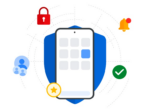
Android 12 has been pushed to the Android Open Source Project (AOSP), and will make its way to supported Pixel devices in the next few weeks. Devices from manufacturers such as Samsung, OnePlus, Oppo, Realme, Tecno, Vivo, and Xiaomi will receive the latest OS later this year.
According to the Android development team, the Android 12 beta saw over 225,000 developers testing early release on Pixel devices, culminating in over 50,000 issue reports.
One of the main themes of Android 12 is UI improvements. Android 12 introduces support for a new language for design, Material You. Other UI updates include redesigned widgets that are more useful and discoverable, notification UI updates, a new stretch overscroll effect in scrolling containers, and app launch splash screens.
RELATED CONTENT: Mobile testing: So many devices, so many variables
The Android development team also worked hard to improve performance for this release. According to the team, they were able to reduce CPU time updated by core system services by 22% and use of big cores by 15%.
Android 12 also prevents apps from starting foreground services while in the background, features more responsive notifications, and faster machine learning. It also introduces Performance Class, which is a set of capabilities that support demanding use cases and high quality content on Android 12 devices.
Privacy is another major theme of the OS update. Improvements include a new privacy dashboard, greater control over location data, indicators for when an app is using the microphone or camera, toggles for disabling microphone or camera access, and the ability to scan for and pair with nearby devices without needing to grant location permission.
Finally, new user experience tools include rich content insertion with a new unified API, support for rounded corners, AVIF image support, compatible media transcoding, easier blurs and color filters, enhanced haptic experiences, new camera effects and sensor capabilities, and better debugging tools.
For developers looking to test if their apps are compatible with Android 12, the developer team recommends that the top changes to test are the privacy dashboard, microphone and camera indicators and toggles, clipboard read notification, stretch overscroll, app splash screens, and keygen changes.
In addition, the Android Dev Summit will be taking place October 27-28 and will include more updates on Android development and Android 12.






